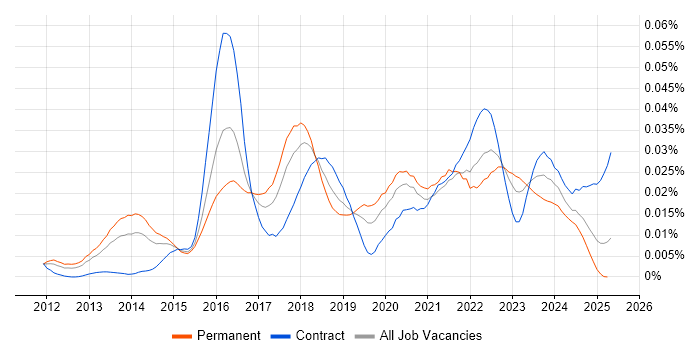Ceph
UK
The table below provides summary statistics for permanent job vacancies requiring Ceph skills. It includes a benchmarking guide to the annual salaries offered in vacancies that cited Ceph over the 6 months leading up to 30 May 2025, comparing them to the same period in the previous two years.
| 6 months to 30 May 2025 |
Same period 2024 | Same period 2023 | |
|---|---|---|---|
| Rank | - | 901 | 940 |
| Rank change year-on-year | - | +39 | +265 |
| Permanent jobs citing Ceph | 0 | 11 | 22 |
| As % of all permanent jobs advertised in the UK | - | 0.011% | 0.023% |
| As % of the System Software category | - | 0.092% | 0.15% |
| Number of salaries quoted | 0 | 11 | 20 |
| 10th Percentile | - | £48,750 | - |
| 25th Percentile | - | £75,000 | £85,000 |
| Median annual salary (50th Percentile) | - | £105,000 | £90,000 |
| Median % change year-on-year | - | +16.67% | +50.00% |
| 75th Percentile | - | £120,000 | £100,000 |
| 90th Percentile | - | £125,000 | - |
| UK excluding London median annual salary | - | £52,500 | £100,000 |
| % change year-on-year | - | -47.50% | +90.48% |
All System Software Skills
UK
Ceph falls under the System Software category. For comparison with the information above, the following table provides summary statistics for all permanent job vacancies requiring system software skills.
| Permanent vacancies with a requirement for system software skills | 6,212 | 11,994 | 15,156 |
| As % of all permanent jobs advertised in the UK | 11.21% | 11.61% | 15.60% |
| Number of salaries quoted | 3,576 | 9,354 | 9,841 |
| 10th Percentile | £28,000 | £26,250 | £27,750 |
| 25th Percentile | £36,250 | £32,500 | £37,500 |
| Median annual salary (50th Percentile) | £53,875 | £50,000 | £55,000 |
| Median % change year-on-year | +7.75% | -9.09% | - |
| 75th Percentile | £76,840 | £67,500 | £77,500 |
| 90th Percentile | £97,500 | £85,000 | £95,000 |
| UK excluding London median annual salary | £47,500 | £45,000 | £47,500 |
| % change year-on-year | +5.56% | -5.26% | -5.00% |
Ceph
Job Vacancy Trend
Job postings citing Ceph as a proportion of all IT jobs advertised.

Ceph
Salary Trend
3-month moving average salary quoted in jobs citing Ceph.
